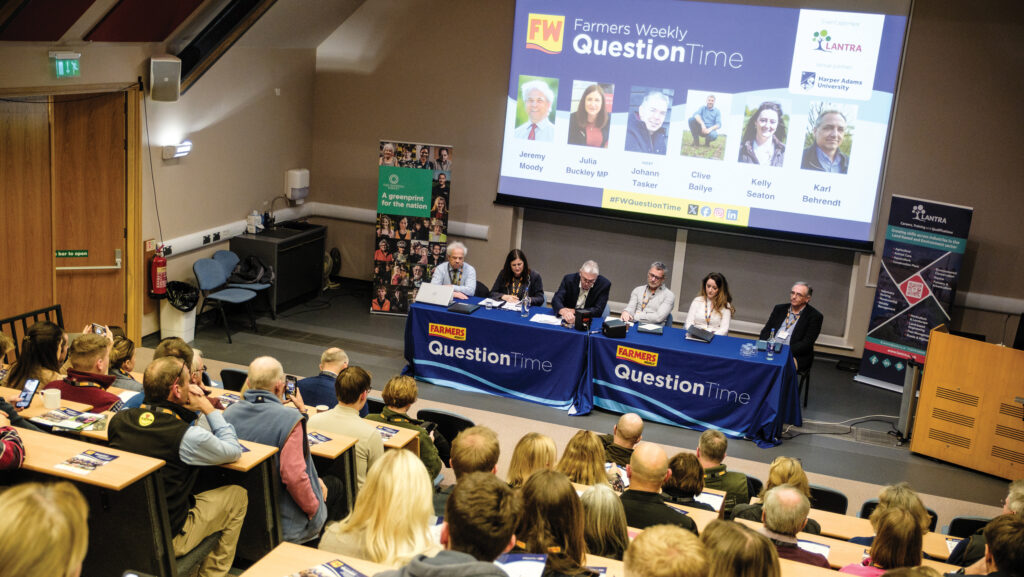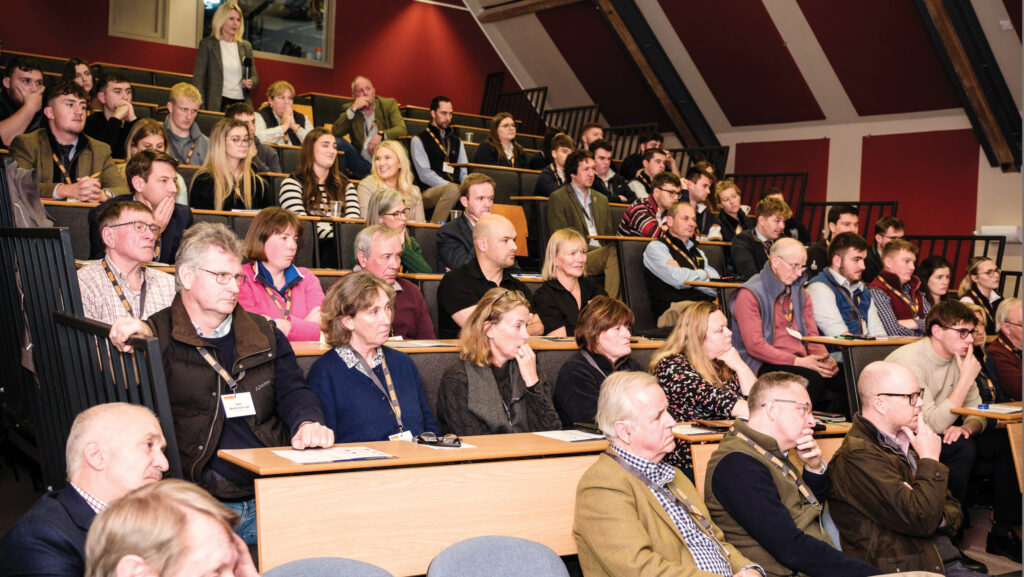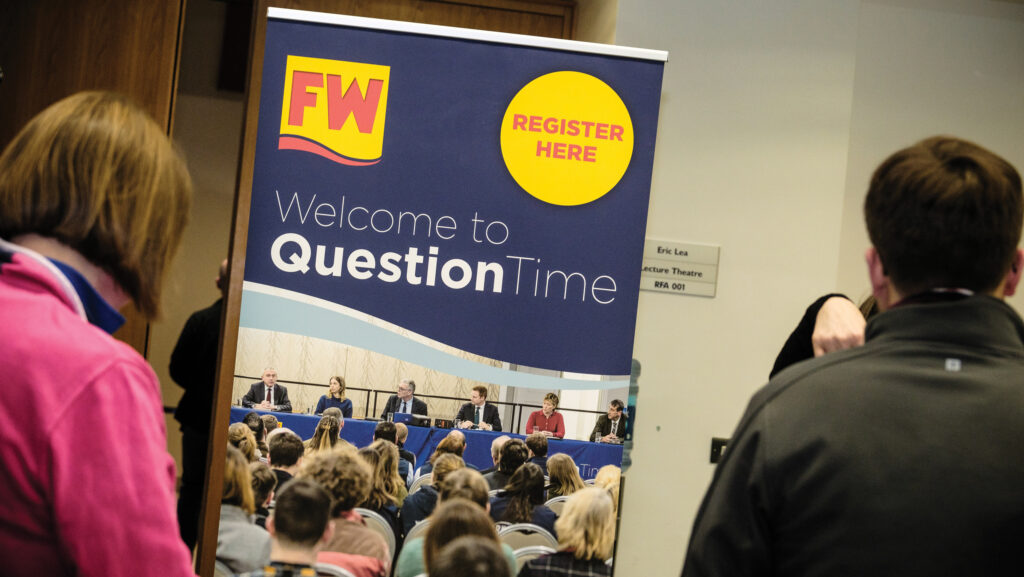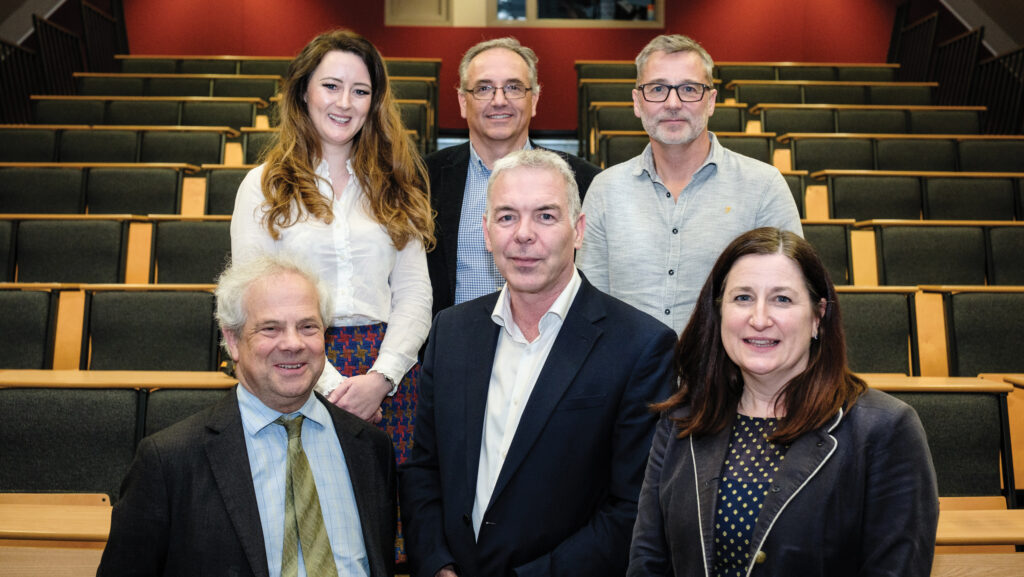Inheritance tax row dominates latest FW Question Time
 © MAG/Colin Miller
© MAG/Colin Miller The row over the recent Budget and inheritance tax dominated the latest Question Time event at Harper Adams University in Shropshire.
We round up the highlights of the questions and answers from our expert panel (see panel details below Q&A).
See also: Food security is top concern at previous FW Question Time
Q: Is it misleading for the government to state that 73% of farmers will not be affected by inheritance tax when this figure includes pony paddocks and hobby farmers?
Labour MP for Shrewsbury Julia Buckley insisted that the figures used by the Treasury were accurate.
“They are based on the exact number of claims for Agricultural Property Relief [APR] for the last full financial year figures are available – 2021-22.
“In that year, 73% of claimants for APR did not have to pay any IHT. The new government is data driven. It is all about evidence – and the evidence also shows that only 7% of APR claims that year were for farmers whose inheritance tax liability was over £2.5m.”
Jeremy Moody, secretary and adviser at the Central Association of Agricultural Valuers, agreed that the 73% figure was “perfectly accurate”. “But it is also entirely uninformative,” he said.
“The position is that APR is simply about agricultural land. A farm will also have machinery, livestock, deadstock, corn in store, entitlements, hefted sheep.
“None of that gets APR – because that is what Business Property Relief [BPR] is there for.
“What we have not been able to get out of the Treasury are the number of BPR claims made by people who also claim APR.
“So when the secretary of state says ‘three-quarters of farmers will be untouched’, he is simply misunderstanding the data in front of him.”
Staffordshire farmer Clive Bailye agreed that the 73% figure was misleading.
“We know that £1m is simply not a viable family farm,” he said. “The capital invested in even a modest family farm is way in excess of that.”
Audience comment: “The 73% is a red herring. It’s not about how many people you’re not going to collect the tax from, it’s about the people you’re going to destroy as you collect the tax.
“On my farm, with 1,000 breeding ewes, we hardly make any money, yet the government has just lined me up for about a £3.5m bill.
“I would have to sell half my land to pay that bill, which makes the other half uneconomic.”
Q: Why is the government targeting farmers in this way?
As well as raising funds to help balance the books nationally, Ms Buckley said one of the intentions was to “change behaviour”, to encourage earlier succession planning.
“I’ve visited many farms where they talk about men dying in their boots, and men in their 50s and 60s working hundreds of hours a week when they don’t control the farm.
“The intention is to encourage farmers to start planning, so you pay less or even no inheritance tax.
“We hope this will empower the next generation of farmers to have more ownership and leadership within these farms.”
But Mr Moody dismissed this argument as “retrospective”.
“This is Treasury driven, to raise money. I don’t think there is any ideology in it. It appears increasingly that Defra only knew about this the night before the Budget.”
Ms Buckley also cited the government’s aim of preventing large city investors from using APR as a tax dodge – buying up farmland at inflated prices to shelter their assets – while protecting smaller farmers.
But Mr Bailye felt the reverse could be the outcome, with even relatively small farms forced to sell land to pay IHT.

© MAG/Colin Miller
“This is the most unsocialist policy I’ve ever come across,” he said.
“The return on capital in farming is less than 1%. Businesses will not have the ability to pay that 20% tax bill, so they will be forced to sell.
“Who are those buyers going to be? It will be huge, corporate investors, probably based offshore, probably not paying tax in the UK.
“This is the new aristocracy – and what they really want the land for is carbon offsets and solar development, the things that really pay.”
Audience comment:
“Your desire to clobber multimillionaires is driven by ideology, not practical outcome. It’s not right to hit anyone when the outcome is so detrimental to our industry.
The NHS costs about £21m an hour to run. This tax will raise just 24 hours of NHS time. Is it worth it?”
Q: What will be the real impact of this policy?
Ms Buckley said she was confident that, with some careful tax planning, the majority of farmers would be able to avoid IHT in future, especially given that a married couple could claim another £2m in nil rate allowances, as well as on the £1m of agricultural assets.
She also pointed to the option to gift assets to the upcoming generation as a way of avoiding the 20% IHT, so long as the donor survives seven years.
Furthermore, IHT payments could be spread over 10 years.
These points were dismissed by the other speakers.
Mr Moody agreed the £3m threshold for married couples with residential property was theoretically possible.
“But we may be dealing with people who are already widows at this point. And when the Treasury says you can spread it over 10 years, well. I’ve modelled that.
“You’re looking at typical rent equivalents of £150/acre to pay IHT – there will be nothing left for breakfast, let alone investment.”
Mr Bailye also pointed to the ageing farming population. He suggested farmers over 67 (the national retirement age) should be able to gift tax free if they survive two years, not seven.
Ms Buckley, however, explained that the rate of IHT was already tapered, so if someone died, say, three years after making a gift, the rate would be 16%, not 20%, and this would fall to zero by year seven.
Q: What about the mental health impact?
Ms Buckley agreed this was a concern, but that the whole industry needed to “keep calm and talk about the facts”.
“The media have been very sensationalist – and there is lots of focus on £1m, when for a couple it can be up to £3m (in nil band allowances from IHT). It is important not to cause more anxiety.”
But Mr Bailye said the government couldn’t have caused more anxiety if it had tried.
“I went from a situation before the Budget where the liability on my parents’ death would have been manageable – about £150,000 or so. The business could afford that. It’s now £4.5m.
“On the assumption that my 78-year old father manages to make another seven years, we can do some mitigation. But why announce a tax, and then encourage people to find ways to around it?”
Audience comment:
“This has put a complete hole in all our succession planning.
“We lost father-in-law two years ago, and my mother-in-law – who is 91 and won’t survive another seven years – well, her state of mind is dreadful. She is worried to death about what is going to happen to everything.”
Q: Does Labour value farmers at all?
Ms Buckley insisted that Labour valued farmers greatly and was taking measures “to make food production in this country viable, productive, and profitable again”.
“The main thing the NFU was lobbying us about before the Budget wasn’t IHT, it was about the agricultural budget,” she said.
“Not only have we sustained it. We have increased it, to £5bn (over two years).”
The government was also committed to using public procurement so that 50% of the catering in schools, hospitals and prisons either came from local, British farmers, or from farmers with a higher environmental and welfare record.
Labour was also determined to negotiate a new phytosanitary agreement with the EU, to make it easier for the British food sector to export.
And it aimed to secure future trade deals that ensured imported food is produced to UK legal minimum standards.
Labour had also not increased income tax or corporation tax in the Budget. “That would have been a further squeeze on the day-to-day profits of already stretched farms,” she said.
But Mr Moody said the government had boxed itself into a corner, with its pre-election pledges not to raise income tax, VAT or employee’s National Insurance.
“You’ve denied yourselves the big, heavy working horses of the tax system, so you’re focusing on a small fraction of the tax system.”

© MAG/Colin Miller
At least raising income tax would share the pain across the whole working population, yet the raid on inherited farmland would raise some £520m a year from those who might struggle to pay.
“That is 7% of the total income from farming – piled on those people who die each year. If you’re looking to cause the least disruption to the economy, you should spread it most widely.
“To raise £520m from income tax would be something like 0.25p in the pound.”
Dairy farmer Kelly Seaton said that, even with the 50% public procurement from local producers, the farmer would still not see any more income, but it would cost the UK more in tax.
Q: How would you rate confidence among farmers right now?
Mr Moody said confidence was a lot lower than it was three weeks ago – especially for those now facing a steep rise in employers’ National Insurance contributions.
“I can think of farmers and veg processing businesses that are £300,000-£500,000 down for next year on where they thought they would be. Confidence rating? 2/10.
Ms Buckley painted a brighter picture, pointing to the fall in interest rates, government plans for infrastructure investments, and measures it is taking to support farming.
“Over time that will restore confidence which I recognise today is not as high as I would like.” Confidence rating? 5/10.
Mr Bailye said his confidence could not be lower. “No one is investing in farming, and any investing I do going forward will be overseas.
“There is no economic example in history of increased taxation growing an economy.” Confidence rating? 0/10
Ms Seaton said she was “hopeful, but not confident”. “The Conservatives may have left farmers to struggle, but Labour has stuck in the boot, and the knife and twisted it.” Confidence rating? 2/10.
Karl Behrend said that, given the structural changes farmers were facing, the government needed to provide both technical and mental health support.
“It’s about helping people transition,” he said. “This is a massive gap in the UK. It exists in other countries when governments have pulled the plug on subsidies.” Confidence rating? 3/10.
Q: Is there any wiggle room in what the government is planning on IHT?
Ms Buckley said that, as she was not “at the top of the tree in government”, it was not for her to say if ministers might change anything.
“But there are at least 100 rural Labour MPs like me and we have repeatedly and vociferously put forward our concerns,” she said.
“If we start to get some more nuanced data, that really helps in terms of painting the picture. We will listen, learn and reflect.”
Ms Buckley also emphasised that there would be a technical consultation on some of the Budget changes in 2025 that the farming industry could feed into.
The panel
Julia Buckley – Labour MP for Shrewsbury
Julia was elected in July as Shrewsbury’s first female MP.
She has lived in Shropshire for 20 years and has spent her career working for neighbourhood improvements and supporting local businesses.
Julia’s first constituency visit was to a local farm, and she is committed to standing up for farmers in parliament.
Jeremy Moody – Secretary and adviser at Central Association of Agricultural Valuers
Jeremy has influenced governments on everything from agricultural tenancies and CAP reform to taxation, planning, environmental issues and the development of post-Basic Payment Scheme support.
He also received the Lifetime Achievement award at the Farmers Weekly Awards 2024.
Clive Bailye – Owner of TWB Farms and founder of the Farming Forum
Staffordshire farmer Clive Bailye is owner of TWB Farms and founder of the Farming Forum – the UK’s biggest online forum for agriculture.
He is also co-organiser of this month’s London rally against government plans to impose inheritance tax (IHT) on farmland.
Kelly Seaton – Farmer and knowledge exchange manager for dairy at AHDB
Dairy farmer Kelly Seaton milks a 260 pedigree Holstein herd with her husband’s parents on the Shropshire/Cheshire border.
Passionate about encouraging youngsters into farming, she is also knowledge exchange manager for dairy at the AHDB.
Karl Behrendt – Director of the Global Institute for Agri-Tech Economics, Food, Land and Agribusiness Management Department at Harper Adams
Karl has over 20 years’ industry experience in farm and agribusiness management consulting, extension and research, and was a sheep farmer for more than 15 years.
His core disciplines are in bioeconomic modelling and decision support for farmers, industry and policy.

The panel with host Johann Tasker (front row, centre) © MAG/Colin Miller
Question Time sponsor
Lantra helps the land-based and environment industries meet their skills needs. It works in partnership with employers, industry bodies and other educational providers and is committed to developing approaches to bring in new entrants and address the acute labour shortages in agriculture.
See more on previous events and sign up for future events on our Question Time website.

